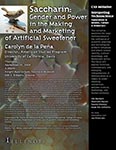Saccharin: Gender and Power in the Making and Marketing of Artificial Sweetener
Knight Auditorium, Spurlock Museum 600 South Gregory Street Urbana
My talk explores the ways in which gender and power influenced the making and marketing of cyclamates and saccharin between 1945 and 1980 in the United States. The first part explores the role of men between 1945 and 1969 through a case study of the development and early marketing of canned fruits sweetened by a mixture of Sucaryl (or sodium cyclamate) and saccharin. Using archival documents spanning the twenty-year relationship between a canning chemist at the fruit canning cooperative California Canners and Growers, and sales agents at Abbott laboratories, I argue that the first artificially sweetened products were created with two goals, and both have to be understood if we want to know why diet products have so proliferated in the post-war United States. First, the rise in popularity of dieting suggested a new market for manufacturers who could take products known to be high in sugar calories (like canned fruit) and render them low-calorie. Second, the men assigned to product innovation in fruit canning and in pharmaceuticals found they could enhance their own status by joining forces with each other. Diet sweet’s history, then, is as much about masculinity through scientific expertise as it is about a rising feminine imperative to be thin. The second part shifts our attention to female entrepreneurs and the mass marketing of artificially sweetened food and beverage products between 1955 and the early 1980s. I use archival materials, contemporary magazines and newspapers, and a close study of the first diet plan to develop an artificially sweetened product line to explore what motivated these women to enter the artificial sweetener industry and how these motivations shaped their approach to marketing new products. It was these women who bridged invention and consumer, who used their unique status as “experts” and females to help a generation of women understand artificially sweetened drinks and desserts as the best way to lose weight and gain power, simultaneously. For men and women who developed these low calorie sweet products, self-invention was as important as product invention in shaping their definition of success. The talk will explore the ramifications this had for artificial sweetener, the impact this may have had on Americans’ attitudes towards food consumption, and the lessons we might take away about considering production and consumption together in both food and technology studies.
WILL-AM580 FOCUS interview with Carolyn de la Pena
American Studies and Director, Davis Humanities Institute, University of California, Davis

